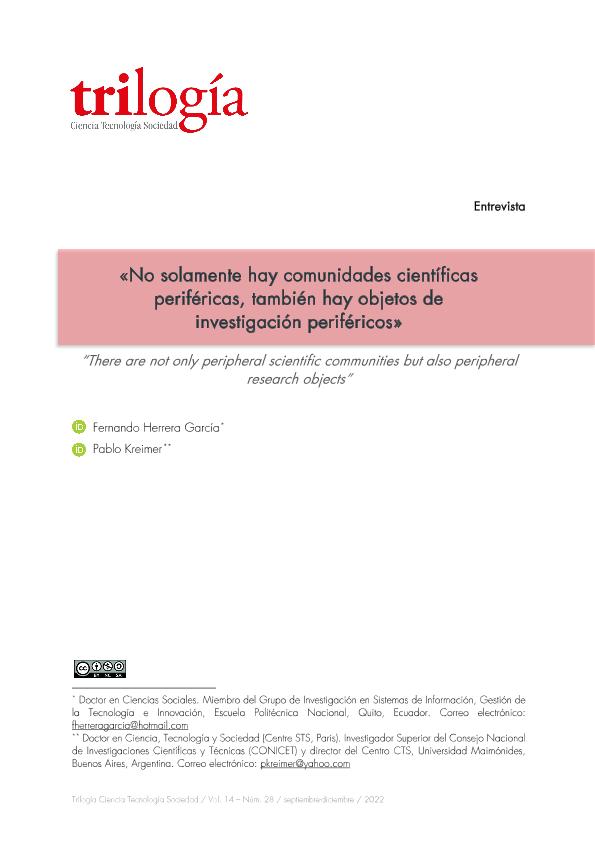Mostrar el registro sencillo del ítem
dc.contributor.author
Herrera García, Fernando
dc.contributor.author
Kreimer, Pablo Rafael

dc.date.available
2023-08-02T16:52:24Z
dc.date.issued
2022-09
dc.identifier.citation
Herrera García, Fernando; Kreimer, Pablo Rafael; «No hay solamente comunidades científicas periféricas, también hay objetos de investigación periféricos»; Instituto Tecnológico Metropolitano; Trilogía Ciencia Tecnología Sociedad; 14; 28; 9-2022; 1-18
dc.identifier.issn
2145-4426
dc.identifier.uri
http://hdl.handle.net/11336/206577
dc.description.abstract
Pablo Kreimer, referente del campo de los estudios sociales de la ciencia, tecnología y sociedad (CTS), relata su trayectoria académica desde las inquietudes que se le presentaron en distintos momentos de su vida respecto a la ciencia y la tecnología y su relación con el entorno desde las políticas científicas nacionales, las relaciones entre centros y periferias, hasta la relación entre problemas de conocimiento y problemas sociales. Al preguntarse ¿cómo surgen y cómo se desarrollan los campos científicos en contextos periféricos, y cuál es su relación con las sociedades en las que se insertan?, propone observar a las disciplinas y a los procesos de institucionalización de estas, como objetos analíticos claves, a observar en contextos periféricos, tal como hizo con la biología molecular en Argentina. Reflexivo y crítico desde una mirada histórica, política y epistemológica, habla sobre el campo CTS con foco en América Latina y resalta los que, en su mirada, son los límites y desafíos de este campo y la relación de los estudios CTS con las políticas públicas, las ciencias sociales y el sector privado. Propone, además, la necesidad de renovar las agendas de investigación, no como un imperativo intradisciplinario, sino como un modo de abordar el clima de su época. Para Kreimer, cuya mirada desde la sociología política de la ciencia da cuenta de las relaciones de poder y de la importancia de los contextos, los objetos de investigación y los enfoques analíticos deben, al mismo tiempo, advertir de los problemas sociales y de la acumulación de conocimiento producido.
dc.description.abstract
Pablo Kreimer, a renowned expert in Science and Technology Studies (STS), shares the concerns he had throughout his academic career regarding science and technology, including how both relate to the social environment (from the perspective of national science policies), the relationships between centers and peripheries, and the relationship between knowledge problems and social problems. To better understand how scientific fields emerge and develop in peripheral contexts and how they relate to the societies in which they are immersed, he suggests treating disciplines and their institutionalization as key objects of analysis to be observed in peripheral contexts, as he did with molecular biology in Argentina. From a historical, political, and epistemological perspective, Kreimer critically reflects on the development of the field of STS, with a special emphasis on Latin America. He also highlights its limitations and challenges (in his opinion) and analyzes the relationship between STS and public policies, social sciences, and the private sector. Additionally, he argues that research agendas should be updated—not as an interdisciplinary requirement, but rather as a way to address the circumstances of their time. According to Kreimer, whose perspective on the political sociology of science takes into account power relations and the relevance of different contexts, research objects and analytical approaches should warn about social problems and knowledge accumulation.
dc.format
application/pdf
dc.language.iso
spa
dc.publisher
Instituto Tecnológico Metropolitano
dc.rights
info:eu-repo/semantics/openAccess
dc.rights.uri
https://creativecommons.org/licenses/by-nc-sa/2.5/ar/
dc.subject
AGENDAS DE INVESTIGACIÓN
dc.subject
CENTROS Y PERIFERIAS
dc.subject
CTS-AMÉRICA LATINA
dc.subject
POLÍTICA CIENTÍFICA
dc.subject
SOCIOLOGÍA POLÍTICA
dc.subject.classification
Ciencias Sociales Interdisciplinarias

dc.subject.classification
Otras Ciencias Sociales

dc.subject.classification
CIENCIAS SOCIALES

dc.title
«No hay solamente comunidades científicas periféricas, también hay objetos de investigación periféricos»
dc.title
“There are not only peripheral scientific communities but also peripheral research objects”
dc.type
info:eu-repo/semantics/article
dc.type
info:ar-repo/semantics/artículo
dc.type
info:eu-repo/semantics/publishedVersion
dc.date.updated
2023-07-27T14:31:07Z
dc.identifier.eissn
2145-7778
dc.journal.volume
14
dc.journal.number
28
dc.journal.pagination
1-18
dc.journal.pais
Colombia

dc.description.fil
Fil: Herrera García, Fernando. Escuela Politécnica Nacional; Ecuador
dc.description.fil
Fil: Kreimer, Pablo Rafael. Consejo Nacional de Investigaciones Científicas y Técnicas; Argentina. Universidad Maimónides; Argentina
dc.journal.title
Trilogía Ciencia Tecnología Sociedad
dc.relation.alternativeid
info:eu-repo/semantics/altIdentifier/url/https://revistas.itm.edu.co/index.php/trilogia/article/view/2592
dc.relation.alternativeid
info:eu-repo/semantics/altIdentifier/doi/http://dx.doi.org/10.22430/21457778.2592
Archivos asociados
